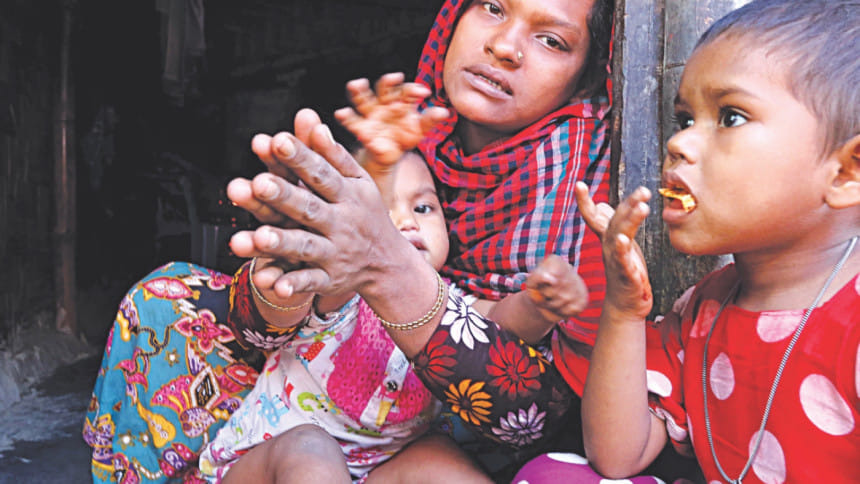Rohingyas sneak in with relatives' help

All they wanted was to cross the Naf river and enter Bangladesh.
Pir Mohammed and his wife Rashida Begum had to leave behind their two sons and all the belongings in Myanmar.
The couple along with their two daughters aged five and three finally made it to Leda unregistered Rohingya camp in Teknaf on Monday.
“They [Myanmar army] detained our two sons on November 19. I don't know where they are now. So we decided to come here,” said Mohammed, who is from Mungnipara in Myanmar's Maungdaw.
The Rohingya man paid brokers Tk 12,000 and crossed the river along with his wife and two daughters. They reached Shah Porir Dweep on Sunday, and arrived at Leda camp the following day.

“Many Rohingyas are coming to the camp and are staying with their relatives,” said Dudu Mia, president of the camp's management committee.
He said law enforcers instructed them to prepare a list of newcomers.
The camp has seven blocks where around 2,500 Rohingya families live. The number of dwellers is now around 25,000, but it keeps increasing every day, he added.
Abul Kashem, who has been living there for 25 years, said he came to the camp with his wife and two children. Now he has 19 family members, including six grandchildren.
Kashem told these correspondents that he saw seven young girls aged between 14 and 18 arrive at the camp on Tuesday.
The girls, who are relatives, came from Gazibil, Zambunia and Rabilla villages in Maungdaw.
“We came here by ourselves, as we don't know the whereabouts of our parents,” said one of the seven girls.
“We had to pay Tk 5,000 each to boatmen on the Myanmar side to cross the river. We crossed it through Rongikhali on November 21 and reached the camp on Tuesday,” she said, adding that they had borrowed the money from villagers in Maungdaw.
Asked whether they faced any obstacles to travel to the camp in Teknaf from Myanmar, she said they were stopped by Border Guard Bangladesh members.
When they told the border guards their tragic stories, one of the BGB men allowed them to travel to the camp, she added.
The girls took shelter at the hut of one of their relatives at Leda camp on Tuesday.
“They are daughters of my nephews and nieces. They used to live in Myanmar. But they had to flee because of the turbulent situation there,” said the 60-year-old Rohingya man from Myanmar, who has given shelter to the girls.
The elderly man, who has been living at the camp over the last one decade, came there with his wife and two children. Now he has 15 family members.

Asked how the girls knew his address in Teknaf, the man said he had been keeping contact with his relatives in Myanmar over the phone.
Several other Rohingyas at Leda camp said networks of telecom operators, including Teletalk and Robi, are available on the other side of the Naf river in Myanmar.
Many of the Rohingyas there keep in touch with their relatives in Bangladesh and cross the border with the help of brokers active on both sides of the border.
The correspondents yesterday talked to Fayez Alam, a Rohingya living in Maungdaw, over the phone, using a Teletalk number, and to Neyamatullah, another Rohingya at Maungdaw's Rambirbil, using a Robi number.
They said many Rohingyas were waiting on the Myanmar side of the river to enter Bangladesh.
Locals said phone communication among Rohingyas on both sides of the border has made the border guards' job of preventing trespassing harder. Every day, hundreds of Rohingyas are trespassing on Bangladesh territory.
They said they learnt that the Myanmar military conducted raids in six villages and Rohingyas were fleeing from those. They are entering Bangladesh illegally by crossing the river with the help of the local fishermen and brokers.
Bangladesh shares with Myanmar a 272-km border that falls in Bandarban and Cox's Bazar. Of this, a 52-km stretch is in the Naf river.
Shafiul Alam, upazila nirbahi officer of Teknaf, said, “Now the task of checking trespass by Rohingyas has become very challenging ... BGB members have stepped up vigilance on the border.”

In a drive on the bank of the river, a mobile court led by Shafiul caught six Bangladeshis, who were helping Rohingyas cross the river. It jailed them for different terms.
Ukhiya police yesterday caught 177 Rohingyas, who trespassed on Bangladesh territory, and pushed them back to Myanmar. Besides, BGB also sent back 14 Rohingyas, who tried to enter Bangladesh by crossing the river.
BGB Director General Maj Gen Abul Hossain visited the border areas in Teknaf yesterday. He is expected to brief the media today.
DHAKA SEEKS INT'L COMMUNITY'S SUPPORT
Worried over the influx of Rohingyas facing persecution in Myanmar, Dhaka has sought support from the international community for resolving the crisis.
Foreign Minister AH Mahmood Ali made the call at a diplomatic briefing at State Guesthouse Padma yesterday.
Dhaka also voiced serious concern at the influx of Rohingyas to Bangladesh in spite of BGB's efforts to stop it.
Briefing the members of the diplomatic community stationed in Dhaka, Mahmood expressed Bangladesh's deep interest in helping the Myanmar government in all possible ways -- from addressing its security concern to contributing in the social reconciliation and economic development of the people in Rakhine State.

 For all latest news, follow The Daily Star's Google News channel.
For all latest news, follow The Daily Star's Google News channel. 



Comments